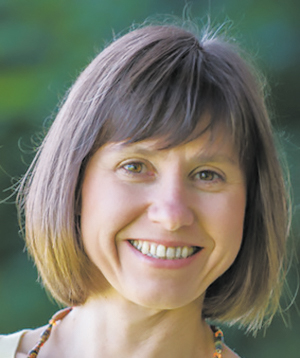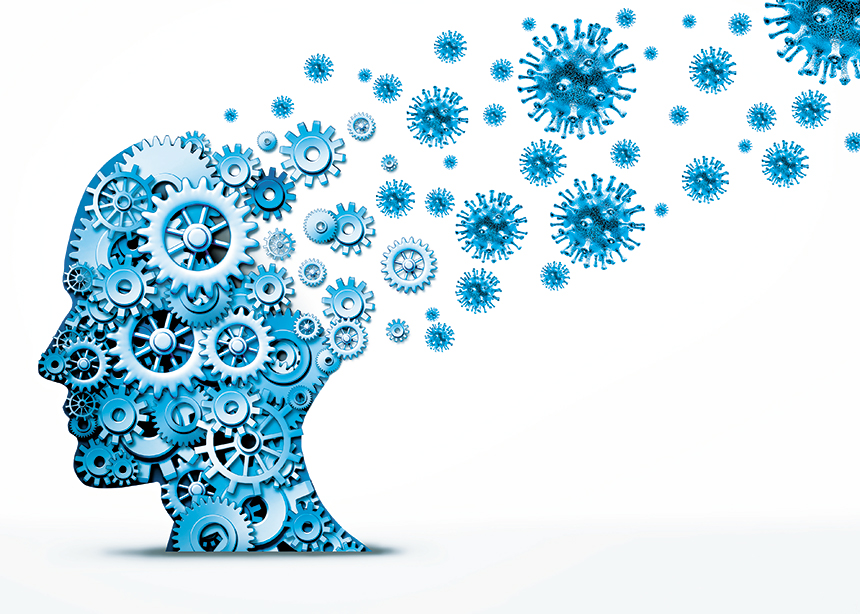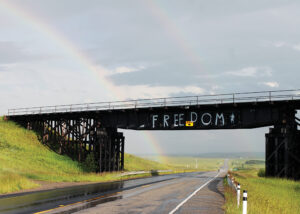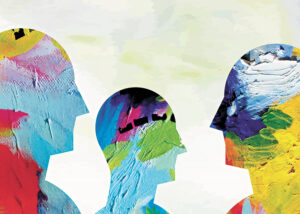As the effects of COVID-19 grow, I am observing a variety of emotional reactions in myself and others. COVID-19 touches everyone’s life. If it isn’t personal illness or loss, we contend with separation, loneliness, deep uncertainty, inconvenient grocery shopping and accessing services that used to be readily available. Children are at home, incomes are at risk. We do not know how long this will last or how bad it will be. We live each day with the discomfort of uncertainty.
Of course, none of us has ever really known what will happen tomorrow, but we live as if we do. Now we are inescapably aware of what has always been true: We are mortal and vulnerable; we are not in control; we cannot know the future; and there is not a lot we can do about it.
These are uncomfortable thoughts. In a world focused on success, security and well-being, we are encouraged to pursue our dreams while ignoring our weakness and mortality. We overcome fear by:
- Ignoring things: Smile until you are happy.
- Minimizing things: It’s not so bad.
- Explaining things: What I understand, I do not fear.
- Distracting ourselves: Let’s do something fun.
Shifting from fear to trust
Behind these façades, anxiety levels were already high. According to the Canadian Mental Health Association (CMHA), 5 percent of the population suffers from “anxiety disorders” causing mild to severe impairment. Statistics Canada figures from 2012 indicate that 8.7 percent of Canadians had a “generalized anxiety disorder” in their lifetime, and half of these experienced depression as well.
People coping with fear and anxiety swing back and forth between responses as the situation, and perceptions of it, change. We panic. We grasp for assurances and control. We deny. We try to understand.
Here is something I notice in myself: The everyday, relatively domestic fear that sometimes stops me from doing something I’m initially drawn to has a restrictive feel and effect. Like brakes being applied to my wheels.
Suppose that I’m feeling this way, and I take time to reflect and sense deeply into myself—particularly in the presence of God or trustworthy human love—then what I usually experience is increasing calm, peace, trust, groundedness, well-being, spaciousness and a presence that I can rely on no matter the circumstances. My fear gradually dissipates. It was mostly fumes in my head.
But sometimes I will find a real and serious basis for my fear. My fear is serving a purpose. It is protecting me from doing foolish things that could put myself and others in danger. It keeps me safe. But if that protective function grows too strong, the fear becomes a prison. My brakes jam on. My life stalls, becoming constricted and limited.
I think this is one reason why anti-anxiety medication is a popular response to these kinds of feelings. It eases them, and complete paralysis is averted. We continue to function. But there is also a problem. Medication can ease symptoms, but it cannot deal with the causes of fear and anxiety, and it can make it more difficult for us to find that real and useful purpose in what we are feeling.
By contrast, trust is an antidote to anxiety, to excessive and paralyzing fear. Trust gives me the confidence and the courage to live with uncertainty and my awareness of it. I feel free to show up and be who I am. My potential is freer. And despite the circumstances, I feel that things will work out. Even if death is coming, it seems that I could face that, and, of course, death is eventually coming.
I find that fear begins to shift to trust when I feel accepted and loved. Acceptance and love calm my fears and energize me. At its most extreme, this is a feeling that can lead to the misguided sense that anything is possible. There is a risk of ignoring reality. That is to be guarded against, too. Although anything is possible for God, I’m human. I need to stay in touch with reality and its real dangers. At the same time, I need to surrender to God’s love and purpose. The knowledge that, even if things turn out otherwise than I hope, I will still be loved, needs to be part of my reality.
Fear and trust are both needed for balance. Both wings are needed if the bird is to fly.
If I can settle into myself and look at my fears from a place of acceptance and curiosity, I can get a better sense of what my fear is really about. Then I can look clearly at both my fear and my trust, and bring them into balance. Remembering that I am loved soothes my anxiety and gives me perspective, but without me turning a blind eye to the world I live in. It is like learning to swim, swim well and strongly with both arms, instead of trying to build an even bigger boat and pretending that a bigger boat will be unsinkable.
An opportunity to grow our trust
Not everybody experiences debilitating or chronic anxiety. And suffering from high anxiety is not a sign of spiritual weakness, lack of faith or spiritual deficiency. It is a particular kind of human challenge—quite a common one—and, like all challenges, it provides opportunity for us to grow. In particular, it is opportunity to grow our trust.
Of course, this won’t happen overnight. We cannot learn to surrender our excessive fear and worry unless we learn to live with an awareness of it, and with a connection to what helps us to feel loved and accepted.
Jesus said in John 16:33b: “Here on earth you will have many trials and sorrows. But take heart because I have overcome the world.” In other words, it is to be expected that we will experience troubles and fear, but we don’t need to remain stuck in our fear. God’s love for us is greater than our fear.
As Mother Julian of Norwich said, “All shall be well, and all shall be well and all manner of things shall be well.”
Mother Julian was a medieval English anchorite who lived walled up in a room attached to St. Julian’s Church in Norwich, England. There was a small opening into the church, so that she could take part in services, and an opening to the outside through which people came to speak with her. This was a time of upheaval and devastation. During Julian’s lifetime, the city suffered the Black Death, the Peasants’ Revolt and the vicious suppression of theological reformation. She must have counselled a lot of people in pain. Yet Julian’s writings are full of hope and trust in God’s goodness. In 1373, at age 30 and so seriously ill she thought she was dying, Julian received a series of visions of the Passion of Christ. She recovered from her illness and wrote of her experiences in Revelations of Divine Love.
Julian is known as a mystic, but she was not out of touch with harsh reality. Her writings are those of an intelligent, sensitive and very down-to-earth woman. Somehow, Julian maintained trust in God’s goodness while living through horrors and addressing doubt, fear and deep theological questions.
Is it a paradox that when we find ourselves in the deepest pit of anguish we can experience God’s love holding us even more tightly and intimately than on happier days? Or is it that we better understand the extent of God’s love? Love is not tied to our happy moments or circumstances. To know that there is nothing God’s love cannot reach (Psalm 139) and there is nothing that can separate us from the love of God (Romans 8:38-39) diminishes our anxiety and opens up space to be more fully present.
Fear promotes our survival
When COVID-19 started to take over our lived reality, I was part of a discussion group in which someone suggested that fear was our greatest problem. By resisting fear, this person argued, by not looking at what scared us, we would keep ourselves safe. I realized they were afraid, and this was their way of coping. But fear is not helped by ignoring what scares us. Fear is even useful; it promotes our survival. When fear and worry are out of balance with trust, then we have a problem. That is when we need to seek help.
Connecting with others and connecting with God calms and grounds us. Love and acceptance calm and ground us. They do not necessarily eliminate discomfort or change current circumstances, but they do change how we experience them.
If there are people in your life who care about you, notice that and cherish that. But sometimes, loving human relationships are not readily available, and our need for human understanding and care cannot be met. This is especially possible at a time of physical distancing. When human love and contact are not there, it is particularly good to know that God is always available.
Lucia Eitzen is a counsellor in private practice; she is a member of the Canadian Counselling and Psychotherapy Association. To learn more, visit agapecounselling.com. She attends Langley (B.C.) Mennonite Fellowship.
For discussion
1. Lucia Eitzen writes, “Acceptance and love calm my fears and energize me.” Is that true in your experience? How do we show love and acceptance to others? Does your congregation have ways of reaching out to members who might struggle with anxiety?
2. Eitzen suggests that there is danger in ignoring reality when we are fearful. When are we most tempted to disregard reality? Is limiting our intake of negative news a form of ignoring reality? Can you think of situations where an unwillingness to face reality led to harmful consequences?
3. “God’s love for us is greater than our fear,” writes Eitzen. What are some ways that we can regularly remind ourselves of God’s love? How helpful have you found songs or memorized scripture in times of fear and anxiety? How important is prayer as a tool in facing fear? How much does regular corporate worship help keep our fears in check?
4. Do you find the current health crisis is increasing your anxiety? No one knows how this pandemic will play out economically, politically or physically. How much does this uncertainty trouble you? What is your biggest fear about the COVID-19 pandemic?
—By Barb Draper








Leave a Reply
You must be logged in to post a comment.